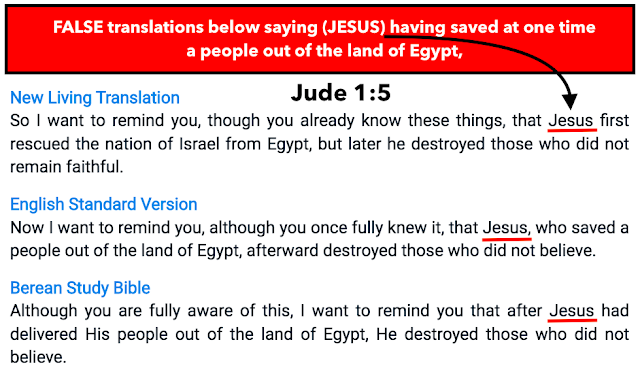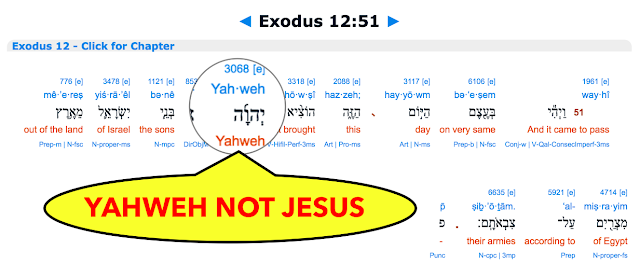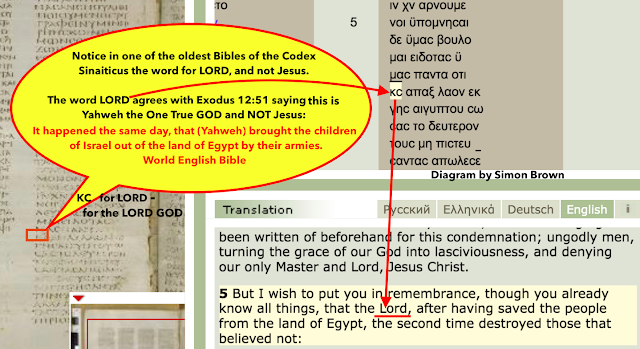WHO saved the children of Israel out of the land of Egypt,
The Lord GOD, or The lord Jesus?
Now these, who were more noble than those in Thessalonica, received the word with all readiness, on every day examining the Scriptures, whether these things were so. Acts 17:11
There are Trinitarians who believe Jude 1:5 says:
Now I want to remind you, you having known all this, that Jesus, having saved at one time a people out of the land of Egypt, afterward He destroyed those not having believed. Jude 1:5.
We also see many more translations below saying (JESUS) having saved at one time a people out of the land of Egypt:
Ellicott's Commentary for English Readers tells us:
How that the Lord.—“How that” depends upon “remind,” not upon “have known.” There is very strong evidence in favour of substituting “Jesus” for “the Lord;” a most remarkable reading, showing how, in Christian language, the Man Jesus had become identified with the Eternal Son. The use of “Christ” in 1Corinthians 10:4, though less striking, is similar.
As we see some Trinitarians believe Jude 1:5 is a proof text proving the Man Jesus had become identified with the Eternal Son, also proving Jesus pre-existed His flesh.
Could this be correct that Jude 1:5 was teaching that Jesus was the person who saved Israel out of the land of Egypt?
The simple answer is given in Exodus 12:51, so lets be a berean Jew and have a look:
World English Bible
It happened the same day, that Yahweh brought the children of Israel out of the land of Egypt by their armies.
We clearly and plainly read Exodus 12:51 saying the person was: Yahweh brought the children of Israel out of the land of Egypt, and NOT Jesus.
WHO is Yahweh?
We know from what both GOD and Jesus told us that Yahweh is the Only One True GOD alone, who is the GOD and Father of Jesus Christ as told in Deuteronomy 6:4, Mark 12:29, Matthew 3:17, John 10:36, John 17:5, and many more scriptures throughout the Bible, which never say GOD is three persons or that GOD is the SON.
What's written in the oldest translations, Jesus or LORD?
Notice in one of the oldest Bibles of the Codex Sinaiticus the word for LORD, and NOT Jesus.
The word LORD agrees with Exodus 12:51 saying the person was Yahweh the One True GOD and NOT Jesus:
It happened the same day, that Yahweh brought the children of Israel out of the land of Egypt by their armies. World English Bible
Notice in the NASB Lexicon how the reading is LORD κύριος (kurios), and NOT Jesus.

Conclusion.
The Biblical facts again prove this is yet again another one of COUNTLESS FALSE translations with the word (Jesus) added that is clearly seen and proved to be FALSE, deceiving people into believing Jesus is GOD or pre-existed His flesh and is instead LORD for Yahweh The LORD GOD.
Sadly most of Christianity still refuse to believe the Biblical facts, and seem to dislike people who teach the truth.
It seems like History has repeated itself, when GOD sent His Prophets to save His people, but were not believed, and were mostly killed, as Jesus was sent teaching the truth, to save the world, who was mostly not believed, and was also hated and killed.
Thank you for reading my research.
Seek and you will find said Jesus.
Simon Brown.
Here is a comment from the professor Bible Scholar Sir Anthony Buzzard:
The Metzger comments on the text starts by saying that this is an impossible reading (ie, it is a blatant corruption, and they gave it a D rating. Later on they waver and say that “Jesus” is attested well.
I would say with many commentators that the correct reading is “the Lord”
Elsewhere Jude never says “Jesus” but Jesus Christ.
I would say that this is a blatant error since it contradicts the rest of the Bible!
The suspicion is that some scribe corrupted the text to read Jesus.
Can Jesus be older than his ancestor David So I suggest,
You can try the argument from the singular pronouns
I am YHVH, Does that sound like 3 persons!!!?
God is an “I” ONE PERSON, thousands and thousands of times.
Simon, Yes indeed Ex 12:50 is YHVH = the LORD
That cannot be Jesus, which would make two GODS!
Anthony.
Here is an article by Michael in Epistles, Koine Greek:
Lord or Jesus? Metzger’s Comments on Jude 1:5
December 20, 2016Michaelby Michael in Epistles, Koine Greek0 Comments
In Jude 1:5 of the English Standard Version (ESV), we read that Jesus delivered the Israelites out of Egypt:
Now I want to remind you, although you once fully knew it, that Jesus, who saved a people out of the land of Egypt, afterward destroyed those who did not believe.
Other translations, including the KJV, NASB and NIV, instead read ‘Lord’ in place of ‘Jesus’ here.
Why the discrepancy?
This is not just a random decision to replace ‘Jesus’ with ‘Lord’, or vice versa. The translators are looking at the manuscript evidence and deciding what they believe the original reading most likely is. The critical editions of the Greek New Testament that many modern translations rely heavily on, the Nestle-Aland 26th and 27th editions, read ‘Lord’ in this verse. It was only in the recently released edition, the 28th edition, that the reading ‘Jesus’ was preferred.
The decisions of which readings to prefer in the critical editions are not made by one person, but rather by a committee of scholars. Dr. Bruce Metzger was one of several scholars who participated in the committee that chose ‘Lord’, and in his textual commentary he communicates the exact reason why it was preferred:
Despite the weighty attestation supporting Ἰησοῦς (A B 33 81 322 323 424c 665 1241 1739 1881 2298 2344 vg cop, bo eth Origen Cyril Jerome Bede; ὁ Ἰησοῦς 88 915), a majority of the Committee was of the opinion that the reading was difficult to the point of impossibility, and explained its origin in terms of transcriptional oversight (ΚΧ being taken for ΙΧ). It was also observed that nowhere else does the author employ Ἰησοῦς alone, but always Ἰησοῦς Χριστός. The unique collocation θεὸς Χριστός read by P72 (did the scribe intend to write θεοῦ χριστός, “God’s anointed one”?) is probably a scribal blunder; otherwise one would expect that Χριστός would be represented also in other witnesses. The great majority of witnesses read ὁ before κύριος, but on the strength of its absence from א Ψ and the tendency of scribes to add the article, it was thought best to enclose ὁ within square brackets. (Metzger 723)
After explaining the Committee’s rationale to prefer ‘Lord’ over ‘Jesus’, Metzger then follows with his own dissenting opinion:
[Critical principles seem to require the adoption of Ἰησοῦς, which admittedly is the best attested reading among Greek and versional witnesses (see above). Struck by the strange and unparalleled mention of Jesus in a statement about the redemption out of Egypt (yet compare Paul’s reference to Χριστός in 1 Cor 10:4), copyists would have substituted (ὁ) κύριος or ὁ θεός. (Metzger 724)
In Bruce Metzger’s dissent, he states that ‘Jesus’ is “the best attested reading among Greek and versional witnesses” and that “critical principles seem to require the adoption of Ἰησοῦς [Jesus].” In other words, a theologically unbiased decision based purely on the principles of textual criticism would prefer ‘Jesus’ here—not ‘Lord’.
The reason for it not being chosen was that a majority of the Committee felt “the reading was difficult to the point of impossibility.” They were convinced, it seems, of the extreme unlikelihood that Jude would have written that Jesus was alive and active within an Old Testament narrative. Perhaps they couldn’t stomach the idea that the earliest Christians believed Jesus existed prior to His physical human birth, something scripture itself attests to in John 1:1.
Fortunately, the reading ‘Jesus’ is now chosen in the Nestle’s critical text, even though Dr. Metzger is unfortunately no longer with us.
Metzger, Bruce M. A Textual Commentary on the Greek New Testament; a Companion Volume to the United Bible Societies’ Greek New Testament (2nd Ed.). N.p.: Hendrickson Pub, 2006. Print.








yes codex sinaiticus ca.350 has KYRIOS, but the oldes papirus with jude is P72 dated from ca.300 it has in Jude 1:5; θεὸς Χριστός this is "God [the] Christ"; the second oldest manuscript of Jude preserved: Codex Vaticanus ca.325 has in jude 1:5 "Ἰησοῦς"j this is jesus as also codex alexandrinus from ca.400; conclution should be understod as "Lord God Jesus Christ"
ReplyDelete